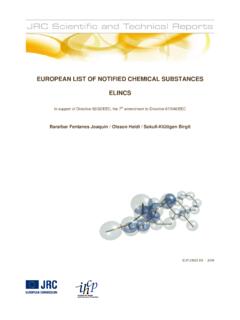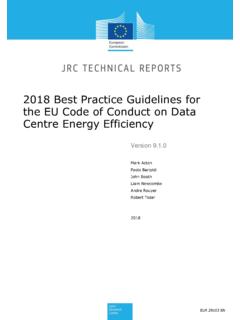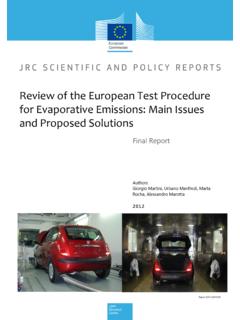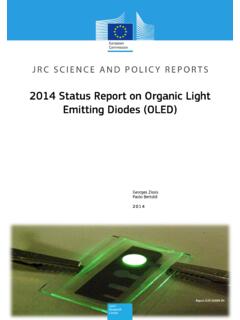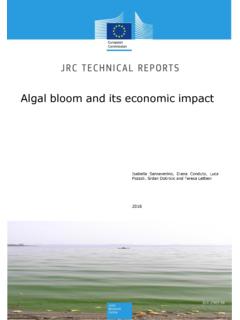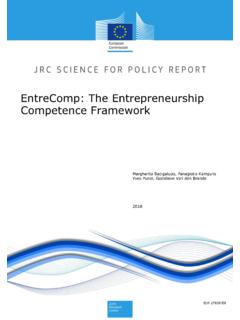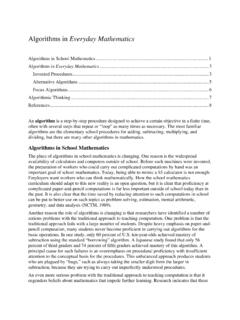Transcription of Developing Computational Thinking in …
1 Authors: Stefania Bocconi, Augusto Chioccariello, Giuliana Dettori, Anusca Ferrari, Katja Engelhardt Editors: Panagiotis Kampylis, Yves Punie Implications for policy and practice Developing Computational Thinking in compulsory education 2016 EUR 28295 EN .. Developing Computational Thinking in compulsory education .. 2 This publication is a Science for Policy report by the Joint Research Centre (JRC), the European Commission s science and knowledge service. It aims to provide evidence-based scientific support to the European policy-making process. The scientific output expressed does not imply a policy position of the European Commission.
2 Neither the European Commission nor any person acting on behalf of the Commission is responsible for the use which might be made of this publication. Contact information European Commission, Joint Research Centre Address: Edificio Expo. c/Inca Garcilaso, 3. 41092 Seville (Spain) E-mail: Tel.: +34 95 44 88 401 JRC Science Hub JRC104188 EUR 28295 EN PDF ISBN 978-92-79-64442-9 ISSN 1831-9424 Luxembourg: Publications Office of the European Union, 2016 European Union, 2016 The reuse of the document is authorised, provided the source is acknowledged and the original meaning or message of the texts are not distorted. The European Commission shall not be held liable for any consequence stemming from the reuse.
3 How to cite: Bocconi, S., Chioccariello, A., Dettori, G., Ferrari, A., Engelhardt, K. (2016). Developing Computational Thinking in compulsory education Implications for policy and practice; EUR 28295 EN; All images European Union 2016, except: Cover image, f/sco Abstract Developing Computational Thinking in compulsory education Implications for policy and practice In the past decade, Computational Thinking (CT) and related concepts ( coding, programing, algorithmic Thinking ) have received increasing attention in the educational field. This has given rise to a large amount of academic and grey literature, and also numerous public and private implementation initiatives.
4 Despite this widespread interest, successful CT integration in compulsory education still faces unresolved issues and challenges. This report provides a comprehensive overview of CT skills for schoolchildren, encompassing recent research findings and initiatives at grassroots and policy levels. It also offers a better understanding of the core concepts and attributes of CT and its potential for compulsory education . The study adopts a mostly qualitative approach that comprises extensive desk research, a survey of Ministries of education and semi-structured interviews, which provide insights from experts, practitioners and policy makers. The report discusses the most significant CT developments for compulsory education in Europe and provides a comprehensive synthesis of evidence, including implications for policy and practice.
5 Developing Computational Thinking in compulsory education .. 3 Table of contents Foreword .. 4 Acknowledgements .. 5 EXECUTIVE SUMMARY .. 6 1. INTRODUCTION .. 10 2. OBJECTIVES AND 12 Desk research .. 13 Survey of MOEs .. 14 Insights from experts .. 14 3. UNDERSTANDING Computational Thinking .. 15 CT 15 Core CT concepts and skills .. 16 CT s relationship with Digital Competence .. 19 CT s relationship with coding and programming .. 21 4. MAJOR TRENDS IN CT INTEGRATION WITHIN compulsory education .. 24 Rationale for including CT in curricula and official guidelines .. 24 CT in compulsory education curricula in Europe.
6 26 Positioning CT in the curriculum .. 32 Examples of CT integration in compulsory education around the world .. 35 5. APPROACHES TO CT TEACHING, LEARNING AND ASSESSMENT .. 36 Pedagogical approaches .. 36 Learning tools .. 39 Assessment .. 40 6. TRAINING TEACHERS IN Computational Thinking .. 42 7. BEYOND FORMAL education .. 45 8. CONCLUSIONS .. 48 Implications for policy and practice .. 49 REFERENCES .. 53 List of Boxes .. 57 List of Figures .. 57 List of Tables .. 57 Annex 1: Ministries of education contributed to the survey .. 58 Annex 2: Experts contributed to the semi-structured interviews .. 59 Annex 3: Type of information sources per Country .. 60 .. Developing Computational Thinking in compulsory education .
7 4 Foreword JRC research on Learning and Skills for the Digital Era started in 2005. The aim was to provide evidence-based policy support to the European Commission on harnessing the potential of digital technologies to encourage innovation in education and training practices; improve access to lifelong learning; and impart the new (digital) skills and competences needed for employment, personal development and social inclusion. More than 20 major studies have been undertaken on these issues resulting in more than 100 different publications. Recent work on capacity building for the digital transformation of education and learning, and for the changing requirements for skills and competences has focussed on the development of digital competence frameworks for citizens (DigComp), educators (DigCompEdu), educational organisations (DigCompOrg) and consumers (DigCompConsumers).
8 A framework for opening-up Higher education Institutions (OpenEdu) was also published in 2016, along with a competence framework for entrepreneurship (EntreComp). Some of these frameworks are accompanied by (self-) assessment instruments. Additional research has been undertaken on Learning Analytics, MOOCs (MOOCK nowledge, MOOCs4inclusion) and policies for the integration and innovative use of digital technologies in education (DigEduPol). This report on Computational Thinking (CT) aims to provide a comprehensive overview and analysis of recent research findings and grassroots and policy initiatives for Developing CT as a competence for the 21st century among schoolchildren, and also to highlight the implications for policy and practice.
9 More information on all our studies can be found on the JRC Science hub: Yves Punie Project Leader DG JRC Unit Human Capital and Employment European Commission .. Developing Computational Thinking in compulsory education .. 5 Acknowledgements The authors and editors of this report would like to thank all the experts from the Ministries of education who participated in the survey for their valuable support and additional information about relevant policies and documents in relation to the CompuThink study (see Annex 1). Our special thanks go also to the experts, researchers, practitioners and policy makers who provided their valuable insights and knowledge on current developments in CT in primary and secondary education , highlighting the major implications for policy and practice.
10 The list of experts interviewed in the CompuThink study is included in Annex 2. We would also like to acknowledge and thank Jim Devine, Educational Consultant and former President of the IADT (IE), and Maciej Syslo, of the Universities of Toru and Wroc aw (PL), for providing valuable and detailed comments on earlier versions of this report. Last but not least, thanks go to Jeffrey Earp, CNR-ITD, for reviewing and proof-reading the final version of this report and to Patricia Farrer, JRC, for proofreading the executive summary and conclusions.. Developing Computational Thinking in compulsory education .
